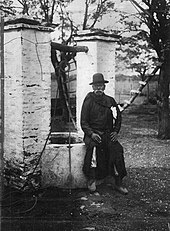| This article needs additional citations for verification. Please help improve this article by adding citations to reliable sources. Unsourced material may be challenged and removed. Find sources: "Don Segundo Sombra" – news · newspapers · books · scholar · JSTOR (September 2014) (Learn how and when to remove this message) |
 First edition of the book, 1926. First edition of the book, 1926. | |
| Language | Spanish |
|---|---|
| Publication place | Argentina |

Don Segundo Sombra is a 1926 novel by Argentine rancher Ricardo Güiraldes. Like José Hernández's poem of the 1870s, Martín Fierro, its protagonist is a gaucho. However, unlike Hernandez's poem, Don Segundo Sombra does not romanticize the figure of the gaucho, but simply examines the character as a shadow (sombra) cast across Argentine history.
Unlike the purely fictional character of Martin Fierro, the figure of Don Segundo Sombra was loosely based on and inspired by the real life of Segundo Ramírez, a native of the town of San Antonio de Areco in Buenos Aires Province. The novel was adapted into the 1969 Argentine film of the same name, directed by Manuel Antín.
Ricardo Güiraldes, who was a friend and literary partner of Jorge Luis Borges –they both founded the legendary magazine Proa –, managed to develop a simple and modern language for the novel: a mixture of literacy and colourful local expressions that earned him a major standing among the best representatives of "criollismo".
Even though it may be considered as having a continuity of sorts with '"Martin Fierro"', the protagonist is more than an extinguished gaucho elegy (like José Hernández's character is); instead, Güiraldes designed Don Segundo Sombra to present (or propose) a series of new ethical examples to a youth that Güiraldes considered disoriented and restless during his time.
References
- Güiraldes, Ricardo. "Don Segundo Sombra".
External links
- Don Segundo Sombra at Faded Page (Canada)
- Don Segundo Sombra at IMDb

This article about a 1920s novel is a stub. You can help Misplaced Pages by expanding it. See guidelines for writing about novels. Further suggestions might be found on the article's talk page. |